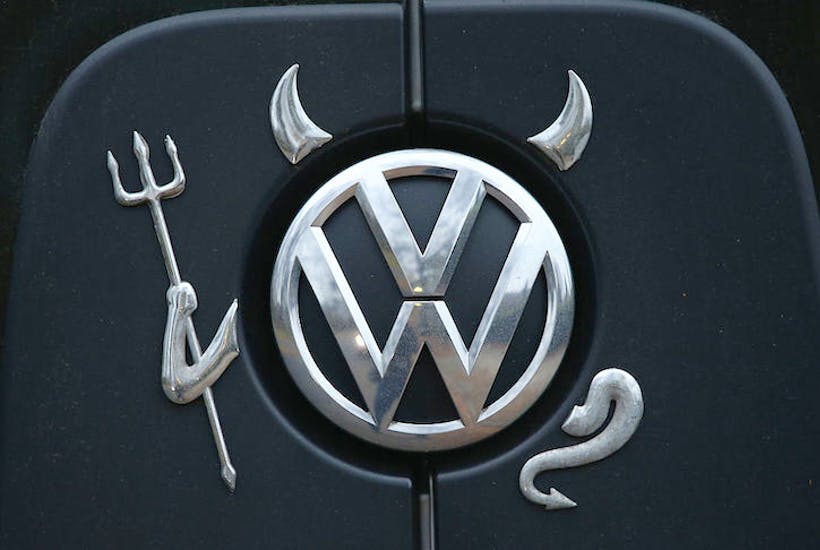Professor Sir David King, the government’s former chief scientific adviser, has finally said something about the diesel emissions scandal that desperately needed to be said. ‘These companies have blood on their hands – I say that without any doubt’, he told the Daily Telegraph. ‘The number of early fatalities in Britain is really very, very large due to NOx (nitrogen oxides) [in the] air, with governments across Europe encouraging diesel on the basis that the catalyst traps worked’.
So now we know that policies which favoured diesel cars (mostly produced by EU carmakers) over their non-diesel competition (mostly produced by non-EU carmakers) are actually killing people. But how did we get to this sorry outcome? It wasn’t predicted, even by probably the most powerful man in the European car industry. In 2004, Der Spiegel interviewed Volkswagen’s chairman, Bernd Pischetsrieder, who noted that stricter EU emissions limits looked set to destroy the market for diesel family cars. After all, the cost of the equipment needed to limit NOx emissions to meet the EU’s new standards would be a massive £1,700 (€2,000) per vehicle. ‘Diesel will not be abolished’, he surmised, ‘but it will survive only in big cars’. Der Spiegel’s prediction? ‘A VW Golf Diesel is unlikely to be built in 2010’.
Mr Pischetsrieder left VW in 2006. And VW went on to sell half-a-million Golfs in Europe in 2010. Many were diesel-powered; but not all contained vital, but costly, emissions prevention equipment.
One can see how Pischetsrieder got his prediction so wrong. There was plenty of criticism of diesel at the time. Greenpeace has always been clear that diesel’s big advantage – reduced carbon dioxide emissions compared to petrol engines – doesn’t outweigh its achilles heel of health-threatening NOx emissions. And non-EU carmakers, such as Toyota, appeared critical, noting that ‘when equipped with all future after-treatment equipment, diesel cars will become as expensive as hybrid cars’. It was suggested (correctly) by others that investment in smaller, turbocharged petrol engines would reduce their CO2 enough to make them as good as diesels.
Pischetsrieder also got it wrong because he couldn’t envisage quite how blisteringly successful European carmakers’ lobbyists would be in protecting a product in which those same carmakers had developed a strong market advantage. In 1997, the Euro II legislation allowed diesel engines to emit 40 per cent more NOx emissions than petrol ones. In each subsequent legislation change, including the current Euro VI standard, diesel cars were allowed to be more polluting than petrol ones. But markets outside the EU – such the United States – set their regulations to be ‘fuel neutral’; sensibly, they did not seek to apparently promote one fuel method at the expense of another. The effect of non-tariff barriers favouring cars made in the EU over outside competition was remarkable: a whopping seventy per cent of diesel cars and vans bought in 2016 were sold in the EU.
Another problem for Pischetsrieder was that he simply couldn’t imagine the depths some would plumb to deceive regulators about the inefficient and cheap catalyst traps carmakers fitted to diesel cars as an alternative to more expensive emissions prevention equipment. Professor King says he was convinced of the traps after witnessing rigged diesel cars at a UK lab emit exhaust that ‘smelled cleaner than normal air’. Unbeknown to him, the carmakers had used software cheat devices that knew when cars were in a testing lab.
This week, in a speech to Parliament, the former DexEU minister Lord Bridges said the government cannot waste further time before deciding, ‘what…we value more, parliamentary sovereignty and control, or market access and trade?’. The diesel emissions scandal clearly marks out these fault lines. Brits mourning the deaths of their fellow citizens due to NOx emissions might wish to reflect that, outside the EU, diesel barely sold at all. The EU is a ‘diesel island’, as a recent report from the Transport & Environment Group put it; diesel barely developed any market share in the US, China or Japan. Even as near as Russia – a country within a day’s drive of the single market’s borders – diesel’s market share in cars peaked at around eight per cent, versus a massive 52 per cent within the EU in 2015. A United Kingdom outside the single market might well have been poorer – but all the evidence suggests we would have been spared the madness of the promotion of a desperately unhealthy technology.






Comments